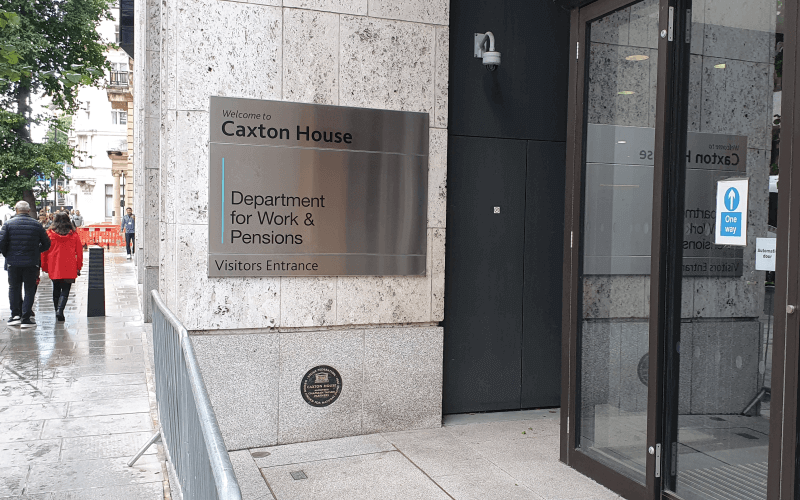Progress on key parts of the government’s disability benefit reform agenda is unlikely to be significantly disrupted by July’s surprise general election, Disability News Service (DNS) has established.
Rishi Sunak’s decision to hold a general election on 4 July means parliament has been dissolved and a series of government bills have had to be scrapped.
But the dissolution of parliament also came in the middle of a crucial DWP consultation and a call for evidence.
The Modernising Support for Independent Living green paper and consultation – which includes options for making it harder to claim personal independence payment and even replacing cash payments with vouchers or one-off grants – is due to close on 22 July.
And the call for evidence on fit note reform – which could see responsibility for issuing fit notes shifted away from GPs and towards “specialist work and health professionals” – is due to close on 8 July.
Although there have been suggestions that the consultation and call for evidence would now have to be abandoned, because of the election, that is not correct.
Civil Service guidance states clearly that ongoing consultations “should continue as normal” and adds: “During the election period, departments may continue to receive and analyse responses with a view to putting proposals to the incoming government but they should not make any statement or generate publicity during this period.”
When asked about the consultation and the call for evidence, DWP would only confirm when they were launched and when they were due to end.
DWP also provided little certainty on other key policies this week.
Policies announced in recent months by the Conservative government appear to be ongoing and there is no suggestion that they have been put on hold by DWP civil servants during the election campaign.
These include plans to accelerate the migration of claimants of employment and support allowance onto universal credit, which is now due to begin in September; plans to tighten the work capability assessment (WCA) from next year; and medium-term proposals to scrap the WCA.
DWP declined to comment on any of these three policies, and directed DNS only to a written statement made by employment minister Jo Churchill last week, in which she laid out the timetable for the universal credit migration.
Despite that statement, there have been mounting concerns about universal credit and its “potential threat to our safety and well-being”, with two coroners writing to DWP in the last year to raise concerns about safeguarding issues after suicides of disabled claimants, including the death of Nazerine Anderson.
Among other policy ideas likely to be presented to the next set of DWP ministers, whichever party wins the election, are the government’s plans for a new fraud bill.
This would give DWP fraud investigators new powers to make arrests, conduct searches and seize possessions, which it has said would “allow DWP to control the end-to-end investigation in the most serious criminal cases, applying for the warrants, leading the operation and searching and seizing evidence”.
That bill would also introduce a new civil penalty for benefit fraud with a “lower burden of proof”.
And although Conservative plans to give DWP sweeping new powers to carry out financial surveillance on benefit claimants through their bank accounts will now be abandoned, as the data protection and digital information bill was not passed before parliament was dissolved, there is nothing to stop the next government re-introducing those measures.
These proposed new anti-fraud powers have been heavily-criticised by many disabled people’s organisations and allies.
Although these anti-fraud policies – and other DWP proposals brought forward in recent months – have been presented as Conservative policies, the history of DWP and the Department of Social Security (DSS) before it, strongly suggests that departmental policy will continue to be driven by senior civil servants rather than politicians.
The last time there was a changeover from a Conservative to a Labour government, in 1997, policy on disability benefits, assessments, fraud and the use of private sector contractors – as well as the culture within DSS – hardly changed.
Labour has yet to express a clear opinion on whether it would take on or scrap existing Conservative DWP policies.
A note from the editor:
Please consider making a voluntary financial contribution to support the work of DNS and allow it to continue producing independent, carefully-researched news stories that focus on the lives and rights of disabled people and their user-led organisations.
Please do not contribute if you cannot afford to do so, and please note that DNS is not a charity. It is run and owned by disabled journalist John Pring and has been from its launch in April 2009.
Thank you for anything you can do to support the work of DNS…

 ‘Disastrous’ cuts bill that leaves legacy of distrust and distress ‘must be dropped’
‘Disastrous’ cuts bill that leaves legacy of distrust and distress ‘must be dropped’ Four disabled Labour MPs stand up to government over cuts to disability benefits
Four disabled Labour MPs stand up to government over cuts to disability benefits Silence from MP sister of Rachel Reeves over suicide linked to PIP flaws, just as government was seeking cuts
Silence from MP sister of Rachel Reeves over suicide linked to PIP flaws, just as government was seeking cuts